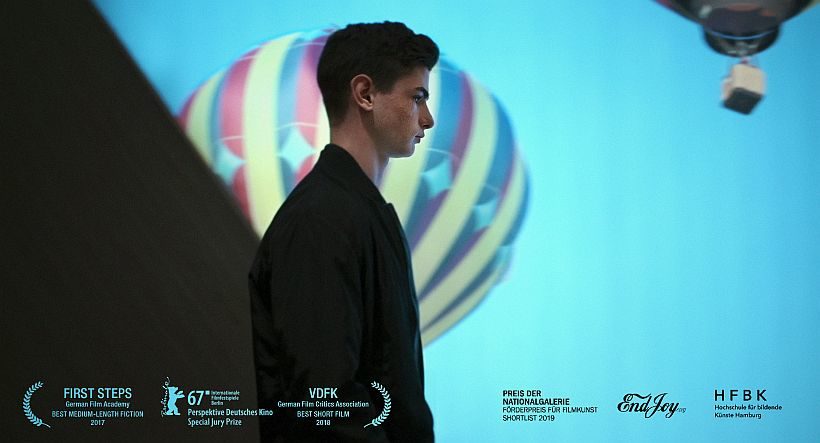
FINAL STAGE (2017) © Nicolaas Schmidt
Nicolaas Schmidt used to be a musician, he founded a virtual support group on sunsets, and has held exhibitions of colours, objects and photos. He usually works alone, having started with photography and filmmaking at almost the same time, before soon moving on to installative pieces in real and virtual spaces. In his work, people are confronted by spaces, objects and non-human animals that are almost their equals, for Schmidt is an explorer of balance. Schmidt’s films intervene in an “ordered” – i.e. hierarchical – perception of reality, and it is only the isolation of the cinema auditorium that lets us succumb to their open, flowing and circulating structures.
“We don’t want to find some trend or other. We want to find the fashion statement that’ll tell the world who we are.” Filmic images on the façade of a building, intended to communicate a feeling. No matter which – so long as there is one. The edit is romantic, as the storyline plays no role per se. A moment from “Final Stage”, presumably Schmidt’s best-known film work to date: Inside a building complex – again with façades. Stores, fast-food outlets, product placements, ad signs designed to sell. The video at the front of the building is running in a loop the whole day long together with other ones. Advertising slogans resounding above a Hamburg junction. A captive video, bound to a purpose, damned to recur endlessly and evoke it at the same time. The colours and shades outstrip each other within it, reminding us that images could in fact become more liberated.
In an expansive, high shot from the other side of the junction, Schmidt reveals this electronic billboard, then plucks out its flickering colours singly over several moments. Frame-filling fields of colour structure his film, and also recur in his other works. Like a flicker attack on his audience, he adapts the commercial together with its music, thus creating space in his film for something that could perhaps be the essence of this advertising clip. An emotion becomes isolated, liberating from its hyping, marketer’s tone. An emotion becomes outsized, ultra large. As cinema is able to do so: Inflate emotions and make them burst. Is the result a distillate? Or perhaps a decomposition, a destruction potentially? The sprinklings of colour challenge the film’s storyline with confidence yet are clearly more than some gimmick. For when the colours appropriate the image, “Final Stage” becomes – for moments at a time – a blue phase, a green phase, a yellow phase, an orange phase, a red phase…
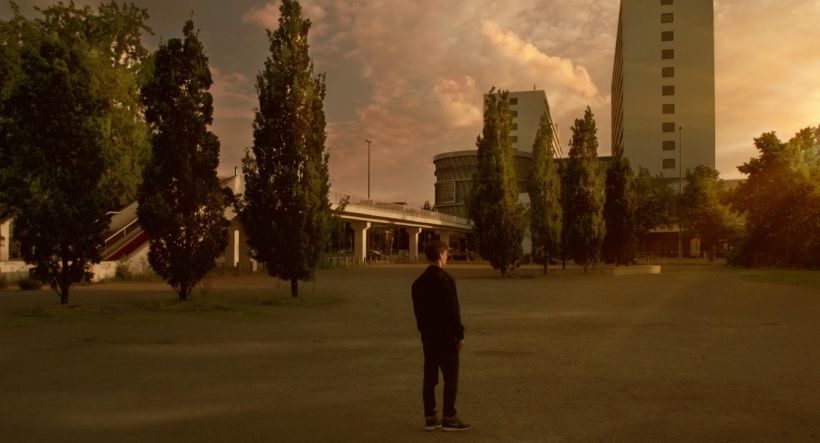
FINAL STAGE (2017) © Nicolaas Schmidt
Nicolaas Schmidt’s films are rare hybrid creatures consisting of found footage and self-shot images, together with elements of pop music. They unfold and reveal themselves where analysis and pathos, concept and experiment encounter each other. “Final Stage” is his longest film to date, and he is currently shooting a sort of sequel to it. “Final Stage” is a kind of meta love film, screened at the 2017 Berlinale and doing the rounds since then, equipped with a minimal story intended, however, to do little more than imply: A young man barely able to stand the feeling of separation from a friend, walking endlessly through a shopping centre. As though this most impersonal of all passageways were a passage of intimacy, reflection and emotional realisation. A film like a tunnel, with tears at the start and a glimmer of light at the end that does, however, slip into darkness.
A filmic triple step, with a dramatic composition full of atmospheric moments, yet almost completely without spoken words. And Schmidt’s only film in which an apparent problem occurs. At least almost. “You can do without problems,” as he mentions in a conversation. And there does seem to be a touch of irony in his sentence. Perhaps this comment always bears an ambiguity within itself, regardless of who utters it. Chatting with the filmmaker, it remains unclear whether he was already aware of his comment, or invented it during the conversation. Just like the other sentences that he poses now and then in his films, intended as a play on whether constructions of meaning and experiments mutually enrich each other, or are in fact enemies:
I BELIEVE IN THE SUN EVEN WHEN IT’S NOT SHINING
– „Believe“ (2019)
WIEN IST ÜBERALL (VIENNA IS EVERYWHERE)
At some point you do really have to ask yourself,
and even take a decision,
whether to get involved in that there,
or abandon it.
– “Die Reise Mit Der Eisenbahn Hat Sich Durchaus Ein Wenig Gelohnt” (The Journey by Train Was Certainly a Bit Worthwhile) (2011)
Back to the shopping-centre passageway from “Final Stage”: During the film’s central 12-minute, camera-tracking shot, music by Björn Isfält resounds, specifically the wordless piece “The Bertil Theme” from Roy Andersson’s “A Swedish Love Story”. And a scene from this 1970s film in turn supplied the idea to Schmidt for “Final Stage”. On the one hand, because that film also revolves around a tragic romance and, on the other hand and especially, because of the way in which the separation is resolved filmically: Two lovers are not capable of being together, he leaves, she cries and watches him depart – the music begins and, far too quickly it seems, their reconciliation occurs unexpectedly. A happy end to a scene that feels over soon, as though the separation had never really happened.
Yet what is it about this moment of doubt? Schmidt asks himself and determines in his homage not to redeem the audience with some means of escape. Instead, he maintains the ambivalence between the images and sounds so long, until this state of suspension and uncertainty becomes meaningful in and of itself. And thus the music from this Roy Andersson moment can now be heard here in Nicolaas Schmidt’s “Final Stage”. Yet it soon slows down, gradually becoming more and more sluggish, until the sorrow and love and suffering become completely and utterly intertwined, and the experience almost surreal. Likewise, the pace of the walk past the shops decreases quite imperceptibly. A transformation, a trance, almost a loop.
In the film, the experiences of melancholy, stagnancy and despair encounter the greatest system currently with an adamant self-propelling force: Capitalism. The buying and selling, the generation of value knows neither pause nor cessation, aware merely of the tirelessly invention of new illusions. Nicolaas Schmidt confronts this system with the fatalism of a human heart that has not yet become broken, but could be so at any moment. If this passageway does not end soon. If the reconciliation does not reveal itself soon. Viewing it all is exhausting, stirring and stimulating to an equal extent. And then, similarly to Isfält’s song, it is also plainly without irony, yet accorded a paradoxical lightness. For love is a permanent coordinate in Schmidt’s works.
His films express the complicated hope of savouring naive experiences, yet also robbing them of their naivety to an equal extent. He does not believe in the need to constantly tell something “new”, as he mentions in the conversation. Instead, he seeks out more fundamental tendencies, and has called one of his web projects on exploring minimalist dramatic compositions “Eternal Trend”. The arrangements are more important than the storylines – the aspects and perspectives of the images that, for their part, recount the world. While his images and sounds are powerful and suggestive in and of themselves, it is not uncommon that they also contain quotes of completely clear rootage and relational logic. In his experimental short films, he undertakes a kind of deep-mining, commencing directly with fragments of film history and images that seem like flotsam, mostly infused with pop music from the 1980s, and flanked repeatedly with footage he himself has shot, consisting of fragments at times and not intended to be films at all. Yet they have become films: Montage films. The observations and collisions delineate and trace attitudes, as the audience works both sensually and detective-like, posing questions to itself: “Something’s not quite right there.”
An earlier work: “Sense + Innocence” from 2009. Schmidt shows a ground squirrel whose intelligence is being tested by scientists. “Squeak the Squirrel” – as is the original title of the video that can still be viewed in YouTube – is supposed to grab a nut for itself, yet for that, it has to deal with an insidious situation. While Squeak struggles to do so, Schmidt lets a song from the Vietnamese female child vocalist Xuan Mai play and fades in a subtitled text about hopes and dreams: “A wonder has to happen,” it seems she is singing, while Squeak reaches for a nut swinging up high on a thread. In the film, gravity and lightness maintain their balance, with just five minutes sufficing for an existential crisis and a gentle upswing.

SENSE + INNOCENCE (2009) © Nicolaas Schmidt
The film anticipates what will distinguish many of his subsequent works: A clarity and care when handling both his own film footage and that of others, all of which are plucked asunder into their parts, so as to blaze up in new shades and tones. Which constitutes an extreme economy of resources, an exploration of cinematic minimalism. Why does he make short films? Schmidt says that a long film is only necessary when there is no other choice. Or in other words, this is a minimalism that also feeds and nourishes itself on his modesty. And in fact, his short film formats permit that to develop and unfold, which would be difficult in a long film: Small filmic elements, which would disappear otherwise behind larger dramatic sequences, take centre stage, become repeated and slowed down, until they rear up again quite unpredictably just before their decomposition. In “Compare” (2011*/2016), for instance, Sinéad O’Connor’s head meets – in a digital image dissolve – the head of Tami Stronach as the Childlike Empress from “The NeverEnding Story” while O’Connor’s song mutates to a plaintive wail by being slowed down extremely. A filmic micro observation.
In 2020, “Inflorescence” was premiered and is reminiscent of the squirrel piece. A flower in a storm before an overcast sky, swaying and bending yet never breaking, always in the frame and forcing its way to the foreground, yet never deliberately or with an aim. Accompanied by a loop of “Don’t Dream It’s Over” from Crowded House. Again slowing down, again repeating, and again the realisation that repetition does not automatically strengthen a feeling, but is instead capable of initiating its transformation. Here, the loop itself is accorded centre stage; the encountering of a technical loop with the natural vibrancy of a plant triggers off questions about what is being perceived, understood and misunderstood at all with such a simple process. In Schmidt’s own words once more: “You can do without problems,” by which he is advocating a cinema that does not have to embed itself in stories, but which is also capable of finding greatness and concision through analytical plays. This time he shot the images himself, yet for that by chance, not design. And for a long time, they refused to acquire a filmic form, existing within his mind as an endless loop beyond any audience. The artist experiments with this on a regular basis, as the practice of film is one he lives every day.
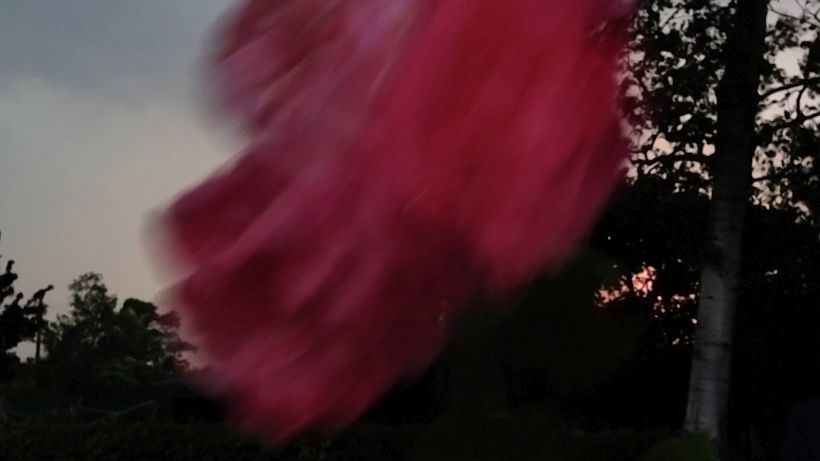
INFLORESCENCE (2020) © Nicolaas Schmidt
The Leipzig-born filmmaker’s work became more compact during his time at the HFBK University of Fine Arts in Hamburg, when he studied free art, time-based media and film. Despite having had numerous festival screenings and awards, he maintains a clear distance from the film industry and the art market. For instance, he first released “Compare” five years after its completion because festival submissions were not a priority for him. Today, he is in the pleasant position of being able to work repeatedly with funding and support, as well as to explore new aesthetic methods, such as directing actors in “Final Stage”. Via the VETO Film platform, together with six other filmmakers, he is trying to establish an authentic label for experimental films. And especially with his series 36KFRGB, he finally took a stand specifically against the logic of exploitation in the media. In addition to producing exhibition works for this, a parody of an online shop was created, for instance, and finally the short film “36000 Frames RGB – 29th Special: Die Manifestation des Kapitalismus in unserem Leben ist die Traurigkeit*”(“36,000 Frames RGB – 29th Special: The Manifestation of Capitalism in Our Lives Is Sadness”). He produced it together with Ray Juster, and they were both awarded for it by the German Competition Jury at the 2015 Hamburg Short Film Festival.
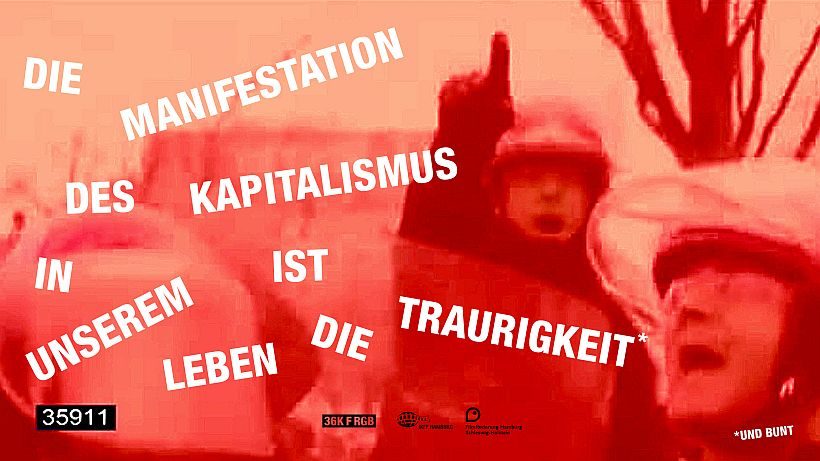
36KFRGB-S29: DIE MANIFESTATION DES KAPITALISMUS IN UNSEREM LEBEN IST DIE TRAURIGKEIT* (2015) © Nicolaas Schmidt / Ray Juster
The only film that names analysis quite explicitly as a strategy, beginning with images from an airplane engineers’ tutorial given by an imposter, soon switches over to advertising material and propaganda images from the aerospace industry and then finally plunges deeply into the visual memory of popular culture. Iconic shots of beautiful, white, crying people are merged with a protest song that moves from laconic serenity to fiery revolt: “You’re not in a crisis. It’s the form they impose upon you that is.” By the way, there was an analogue montage in an earlier film that says much about Schmidt’s humour and how he does indeed like to avoid explanations, but possesses a fine awareness for the policies of his interventions: In front of the camera, a kebab, a pizza, a hotdog, a burger and a portion of chips are ground into a mush in a mincer. The mush is then brought to a sizzle in a microwave and served up on a plate with skewers like regurgitated food. This is accompanied by a woman speaking about men’s desires, future fears, intersecting courses of life, and suicide. “Enjoying Without a Bad Conscience”.
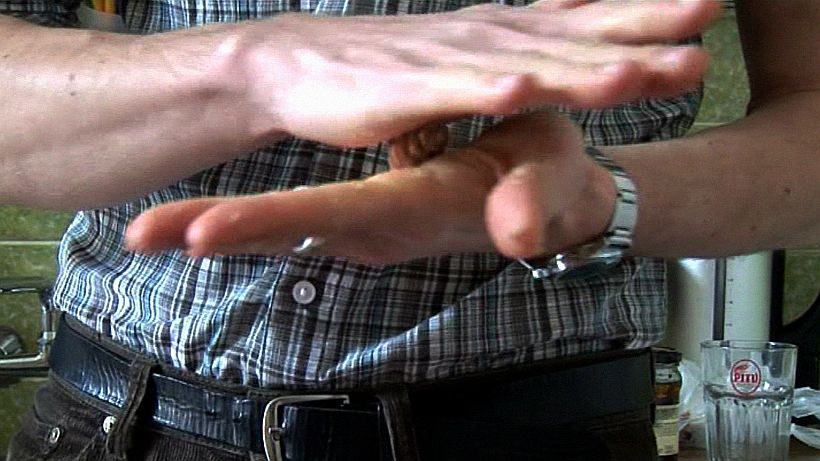
OHNE SCHLECHTES GEWISSEN GENIESSEN (2010) © Nicolaas Schmidt
Filmografie
2020 Inflorescence
2019 Believe
2018 Who’s The Next One (THERNST)
2017 Final Stage
2016 Compare (2011*)
2015 Autumn
2015 36KFRGB-S29: Die Manifestation Des Kapitalismus In Unserem Leben Ist Die Traurigkeit*
2014 Leaving Monochromia
2013+2014 36000 Frames RGB (Serie)
2013 Break
2012 Forever
2011 Die Reise Mit Der Eisenbahn Hat Sich Durchaus Ein Wenig Gelohnt
2010 Ohne Schlechtes Gewissen Genießen
2010 Der Lauf Und Chopin
2009 Sense+Innocence
2008 Neuseenland